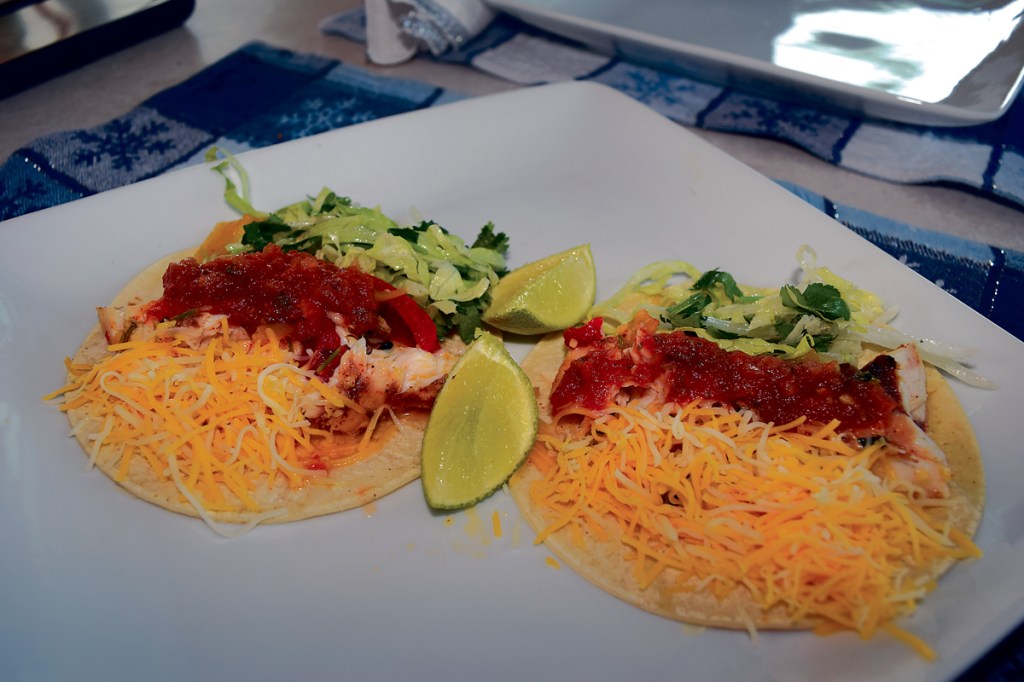Ho-hums? Turn to drum
Published 5:00 am Wednesday, January 4, 2017

- Black drum have the perfect texture to make fish tacos. Seasoned with Southwestern flavors of cilantro and lime, Thomas Hymel’s recipe delightes even the fishermen.
Start the new year with locally caught fish
Douglas and Crystel Olander have their own dock for Big D’s Seafood in Franklin. Three years ago they started the Vermilion Bay Sweet for black drum to expand the productive season for their fresh caught seafood.
His cousin Thomas Olander, chairman of the Louisiana Shrimp Association, is out of Cypremort Point. They are members of a fishing family Thomas Hymel of the Louisiana State University AgCenter and Sea Grant Louisiana program calls a clan.
“The Olanders are a multi-generational commercial fishing family made up of cousins, brothers and nephews. But if you go and look at their family tree, you’ll find fish and shrimp hanging off of it,” Hymel said.
Both lines are in the fourth generation owning their own boats and running their own businesses.
Born into the Business
The Olander fishermen are in the shrimp business, but also are in the seafood industry to provide fresh wild caught fish to restaurants as well as vacuum packed filets directly to the kitchens of local cooks.
“We didn’t get fishing from our grandpa’s side but from our grandma’s side. They were on the Great Lakes,” said Douglas Olander, 47. “My grandma and her daddy came down the Mississippi and ended up in Biloxi. My grandpa came from Connecticut. They got married and when the Intracoastal was built, came down to Weeks Island. We branched out from there.”
Douglas Olander said he started fishing with his father when he was 5 years old.
“He really didn’t trust me thinking I’d drop the fishing pole so he tied it with a little piece of string,” Douglas Olander said. “But it never hit the water. I had a partnership with him when I was 16 years old and at 18 got my own boat. (Later)we had to figure out new ways of catching fish.”
That’s the way the children were kept occupied growing up and moving into the vocations they continue today. Douglas said Olander is a big-big family but they never did get far away from Weeks Island. Now they have access further and further out through the fishing boats for wild caught fish.
“The younger ones are in town now, but the older ones are still at The Point,” said Crystel Olander. “We bought nine acres here (Port of St. Mary).”
Jared Leger’s mother is an Olander. His sister and three first cousins are part of the clan and he feels the family business is something to fall back on if life ever goes south. He wants to be a firefighter first and foremost. His cousin, Corey Olander, already has a boat and his own business.
Out of the Water
Thomas Olander shrimps strictly out of Cypremort Point but Douglas Olander has branched out to include processing and distribution of black drum.
“This business here buys more drum, producing about a million pounds of fish a year,” said Hymel. “You have to have somebody buy (your catch).”
Douglas Olander has three fishing boats and he also buys from up to eight other boats. About five of the fishermen he buys from fish for drum 365 days a year.
“A lot of families depend on us,” Douglas Olander said. “I have a little processing place here but 90 percent of my fish is still brought to New Orleans to the white table cloth restaurants.”
Processors buying for The Palace, Mr. B’s Bistro, Redfish Grill, all around the Quarter with distribution onto cruise ships — even along the coast of Mississippi — are eating Olander black drum.
“The new business is the processing,” said Crystel Olander.
Cooking is Business
Fresh, cut, frozen in vacuum-packed bags is almost like fresh from the water, Hymel said.
“What I’m going to do is a real simple dish, Fish Tacos,” Hymel said. “This is probably a 45 minute deal from beginning to end, but I cook a lot. Cilantro isn’t used much around here but I travel to South America and they use it in everything.”
Sea Grant Louisiana, part of the LSU AgCenter, has been a part of Olander’s expansion for its three years in business. The goal of the program is to help the business owner, the fisherman, do more with what they have.
“Douglas and I met and we were first talking about direct marketing. He had already built the processing plant but had never cut the fish,” Hymel said. “We were able to work together to walk all the way through learning to cut the fish for the package, what kind of packaging to use, creating a label and now he has markets and continues to expand.”
His fish is now sold in San Francisco and in restaurants in Atlanta all as his process has been perfected — and confidence in delivering a quality product grown. It’s important to maintain the product’s integrity in a retail pack, Olander said.
Experimenting in Abbeville
“We did an experiment with red fish and drum,” Crystel Olander said. “A lot of people don’t know the drum. To help them understand they prepared both and right there people saw the drum was better.”
Even though the drum was frozen, it still tasted better than fresh red fish, Crystel Olander said. Now they never eat their drum at home, they always eat it at Shucks.
The control of the fish from the catch, transportation on the boat to the dock, through processing is handled by one team, the Olanders. The quality control for the vacuum packing is the best thing for freezing which is done in minutes so the fish is like fresh when its ready to be cooked.
A chef in Georgia thought she had to have fresh fish until she tried the Vermilion Bay Sweet Black Drum.
“If you buy it today and cook it this week or six months from now, it’s still the same fish,” Hymel said.
“With the frozen, there’s no waste with in a restaurant. It tastes like you just filleted it,” Douglas Olander said. “The old way with water packing changed the taste, but the vacuum pack makes the difference.”
It’s a start. They are making baby steps. Anyone interested in black drum filets for home consumption can contact the Olanders directly by calling 201-0329 for pick up times at the dock.
“All of our fish, no matter how much we catch, we have a home for them,” Douglas Olander said.





